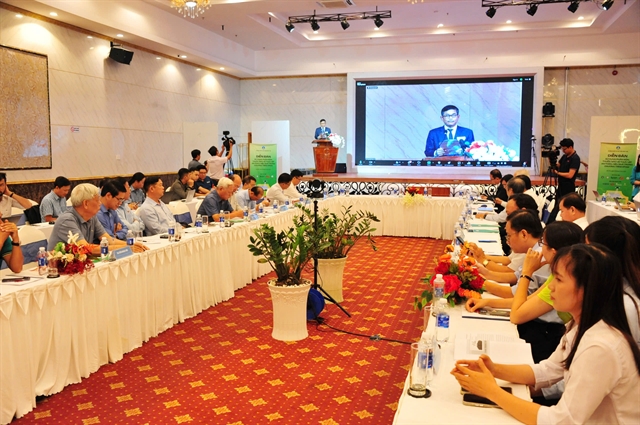Việt Nam advances towards circular agriculture with plant health programme expansion
Society – Economy - Ngày đăng : 10:55, 20/12/2024
 |
| Participants at the workshop. — Photo nongnghiep.vn |
HÀ NỘI — Over 80 per cent of communes cultivating key crops like rice, longan, lychee, dragon fruit, coffee, pepper and tea aim to have core farmer teams trained in effective and safe use of fertilisers and pesticides under the Integrated Plant Health Management (IPHM) programme by 2030.
Each province growing these crops will have five national and 20 provincial IPHM trainers, while each commune will have two community guides and five core farmers.
This was highlighted by Lê Văn Thiệt, Deputy Director of the Department of Plant Protection under the Ministry of Agriculture and Rural Development, during the workshop on safe and effective use of fertilisers and pesticides within the IPHM Programme held on Thursday, both in person and online.
The programme also strives to apply IPHM principles to 90 per cent of the cultivation area for rice, longan, lychee and dragon fruit, and 70 per cent for coffee, pepper and tea in each province. This would reduce pesticide use and chemical fertilisers by 30 per cent.
Over 90 per cent of communes involved in these crops are expected to implement the proper collection of used pesticide packaging.
The Department of Plant Protection has collaborated with associations and organisations to expand the use of biological fertilisers and pesticides.
According to Thiệt, unpredictable climate change is posing significant challenges, including natural disasters, storms, droughts and saltwater intrusion, which negatively impact crop growth and livelihoods.
Climate change also creates ideal conditions for the emergence of new pests, making agricultural production increasingly difficult.
Currently, Việt Nam has 8,000 planting area codes and over 1,500 packing facility codes.
The adoption of scientific and technical advancements is expected to enhance product quality, facilitating easier export.
To build a sustainable and modern agricultural sector by 2030, with a vision towards 2050, localities must focus on expanding advanced production models.
There is also a need to develop and replicate biological solutions for pest control, promote the use of biological fertilisers and pesticides, and cooperate with foreign companies.
The sector must prioritise applying Industry 4.0 technologies and digital transformation in farming and information access. This will enable proactive disease control, minimise chemical inputs, optimise resources, and enhance farmers' profits.
“To develop and expand the IPHM programme successfully, the involvement of the entire political system is essential,” Thiệt said.
Participants at the workshop said that implementing IPHM addresses urgent needs such as soil degradation, climate change adaptation, product value enhancement, and ecological protection.
The programme encourages ecological, organic, and circular agriculture, producing safe, climate-resilient crops while reducing greenhouse gas emissions and promoting soil and water health.
Farmers are urged to adopt biological pesticides derived from microorganisms rather than live organisms.
Pesticides remain vital for pest control, ensuring food security, boosting productivity, and maintaining crop quality.
However, Việt Nam's tropical climate also presents significant pest and weed challenges.
Nguyễn Văn Sơn, Chairman of the Việt Nam Pesticide Manufacturers and Traders Association, said that both chemical and biological pesticides contribute to agricultural development in Việt Nam and worldwide.
Proper and regulated use of pesticides can ensure safe agricultural production for both domestic and export markets.
Coordinator for Croplife Việt Nam, Đào Thu Vinh, said that IPHM practices and improved crop varieties strengthen plant health, enabling resilience to environmental and pest stressors.
Advanced breeding methods, such as genetic modification (GMO) and gene editing, further enhance crop productivity while minimising protection measures, reducing costs, and preserving resources like soil nutrients.
From 1996 to 2020, genetically modified crops reduced pesticide use by over 748 kilograms, fuel consumption by 14.662 million litres, and CO2 emissions by 2.33 million kilograms, equivalent to taking 1.58 million cars off the road for a year.
"Việt Nam is accelerating research on gene-editing technologies. Progressive and forward-looking policies will serve as a catalyst for creating and introducing improved crop varieties to farmers, empowering them to implement IPHM/IPM effectively and promote sustainable farming,” Vinh said. — VNS
